Credit cards might be convenient and reliable, but there are some scenarios where swiping or entering your digits could be dangerous
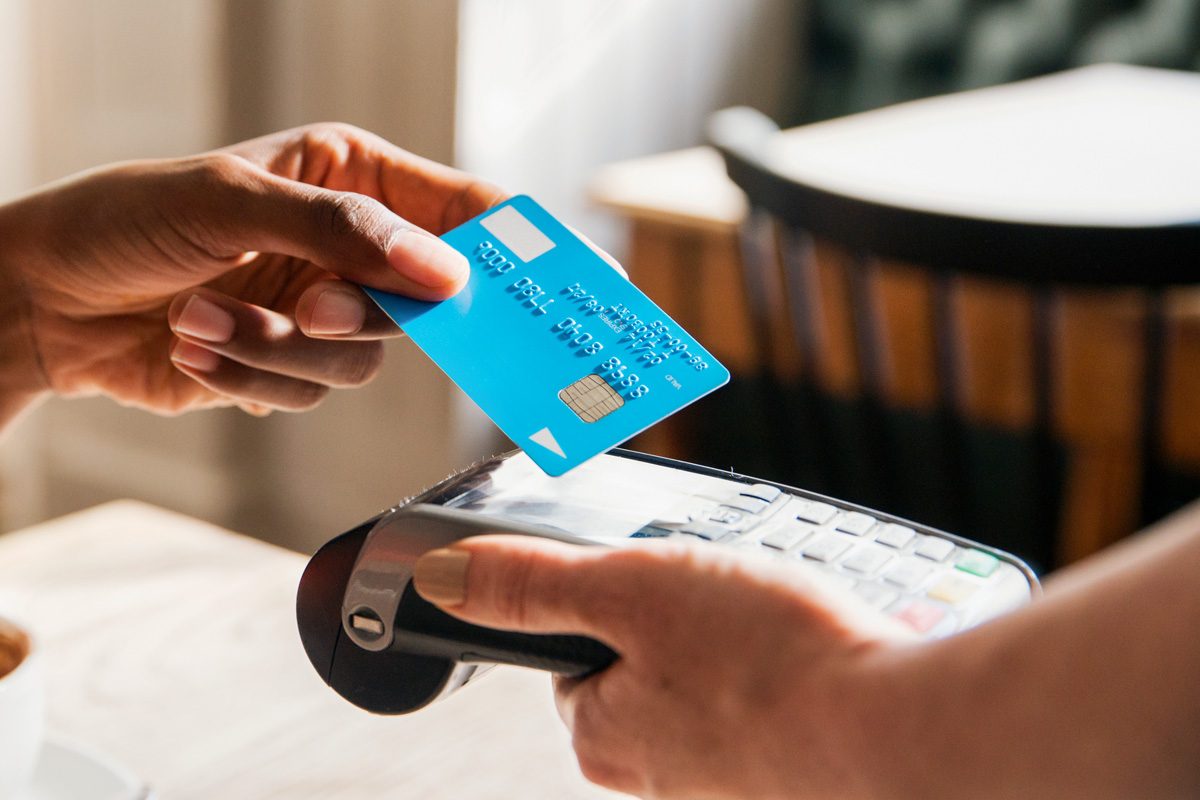
10 Times You Shouldn’t Use Your Credit Card for Payment

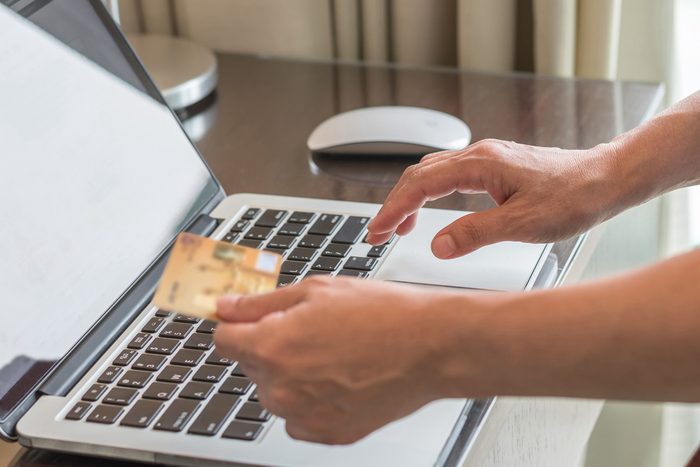
You suspect your card has been compromised
Some credit card companies, including American Express, Mastercard and Discover, send transaction alerts if they spot an unusually large purchase or a deviation in your spending habits. These alerts allow you to confirm or deny via text or email that you are the one attempting to make a purchase. If you don’t recognize the charge, your card might have been compromised. Fortunately, there are steps you can take to protect yourself.
“Credit cards offer purchase protections, and you are not responsible for unauthorized charges made on your card,” Kingsley says. “Two-factor authentication can help block anyone who gets your banking information from using it, and setting up credit monitoring helps you know if your card is used fraudulently.” If you lose your credit card or suspect fraudulent activity, Kingsley advises contacting your credit card company and locking your card.

When you’re making a purchase you can’t afford
My mom always told me that if you can’t afford it today, you won’t be able to afford it tomorrow. This is particularly true when it comes to credit cards and buy now, pay later apps, since you’ll accrue interest if you don’t pay your balances in full.
“Carrying a balance leads to interest charges, and interest is very expensive!” Delgado says. “Interest on an unpaid credit card balance can quickly add up and become unmanageable.” If you can’t afford the item you wish to purchase without the help of a credit card, don’t buy it. “Sticking to a budget, and only purchasing items with an intention to pay [your balance] off in full, is the best strategy,” Delgado says.

Over the phone, via text message or email
According to Morgan, emailing or faxing credit card authorization forms to vendors can be appropriate. But never give out your credit card number over the phone or through text messaging. “If someone calls you for a payment, unless it is someone you know or a call you expected, you shouldn’t pay over the phone with a credit card,” she says.
If you receive a call or text from someone claiming to be from your credit card company, tell them you’ll call back, Morgan says. Then, call a number you know, like the customer service number on the back of your credit card.
Also, be wary of emails. “Major companies will not be doing business using a Gmail or Yahoo email address,” Morgan says. “Make sure the email is from the proper domain.” When in doubt, she recommends calling the vendor separately and asking questions.

There is a fee associated with your payment
Every time you swipe your credit card, the merchant is charged a small percentage of the transaction amount. Some merchants may pass this cost onto customers by charging a credit card transaction fee, or offering a cash discount. Morgan advises against using your credit card if there is a fee associated with your transaction, especially for potentially large expenditures like taxes and rent.
“The IRS has a transaction fee for payments made via credit card that usually cancels out any benefits,” Morgan says. “So if there is a fee of 3% to 5%, it usually won’t make sense to use a credit card. Also, there is usually a fee to use your credit cards to pay rent.”

A merchant seems untrustworthy
Never give out your credit card number to merchants who seem untrustworthy. “Using a credit card on questionable websites, or with questionable businesses, increases the risk of fraud and unauthorized charges,” Delgado says. If you’ve never heard of the company or product, he advises holding off on your purchase until you do some research and confirm the brand’s legitimacy.
Telltale signs of an untrustworthy merchant include poorly written emails, product descriptions filled with grammatical and spelling errors, a website that lacks a secure icon in the address bar or a website that just looks incomplete, Delgado says.
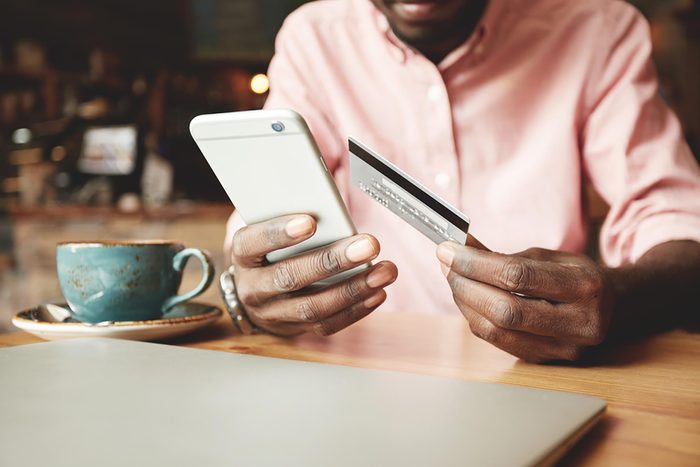
You’re already struggling with high balances
There are plenty of ways to save money and get out of debt. Ditching your credit card is a great place to start, especially if you’re already struggling with high balances. “Adding more credit card debt when you’re already having trouble making payments can make financial recovery even harder,” Delgado says. He recommends using a debit card or cash, which prevents you from accumulating more debt. Not only that, but psychologically, it may prevent you from overspending because you’re parting with cash vs. pulling out a credit card.
Morgan agrees. “Anytime you carry a balance, any real benefits for credit points is cancelled out,” she says. “Also, remember that credit card interest is calculating on a daily average basis. So even if you pay off more each month, it is more costly when you use a card that has a balance.”
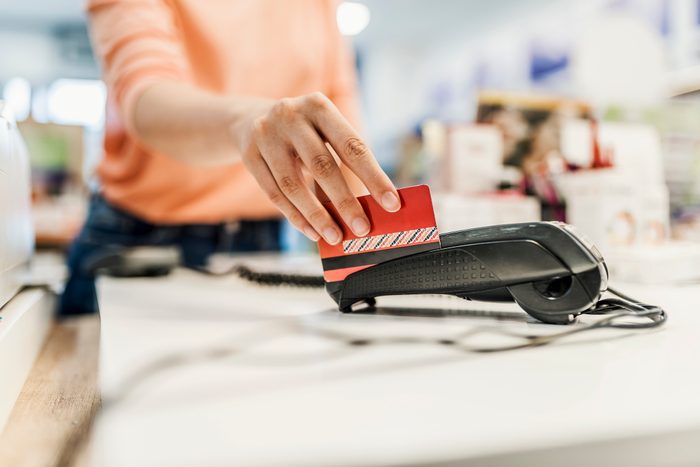
Something looks off about the card reader
Thieves sometimes add “skimmers” to point-of-sale card readers to steal payment card data, and devices that have been tampered with can be hard to spot. But if you know what to look for, you may be able to identify a credit card skimmer and save yourself from having to deal with the aftermath of fraudulent activity on your card.
“If the machine looks or feels like it’s coming apart in some places, the alignment is off or there’s raised parts of the machine, that’s a sign it could be a skimmer,” Delgado says. “Check nearby payment terminals and see if there are similar inconsistencies. Gas pumps also have security seals near the card reader; if that seal is broken, there might be a skimmer installed.”
If something does look “off ” about the device, Delgado recommends advising the business or law enforcement immediately. Additionally, he suggests discouraging others in line from using the payment terminal.
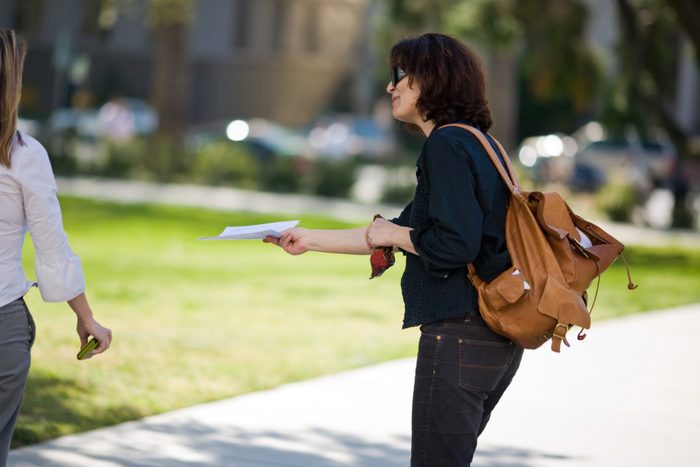
When someone approaches you on the street
You’ve probably seen charity fundraisers walking the streets in an attempt to collect donations for a variety of causes—the environment, child welfare and pet care, to name just a few. They might only ask to take your name down so they can contact you at a later date, but if they ask you for your credit card, beware.
If someone is asking for donations by copying or writing down credit card numbers, instead of using a credit card terminal, Morgan says that’s a good time to use cash. “Anytime in-person transactions are happening that require a written authorization instead of a credit card processing application, there is a higher risk of numbers being leaked or used for the wrong amount.”
If you want to contribute to these causes, a safer bet is to visit their website, check that it’s secure and then make a donation from there.

When a website address does not begin with “HTTPS”
Even the most tech-savvy people can fall victim to scammers. Luckily, there are steps you can take to lower your risk, especially when shopping online. “For any payment page where you enter credit card or bank information, it’s imperative that the URL [starts with] HTTPS,” Delgado says. The “S” indicates that the website encrypts your connection to the site, along with any information you input into the site—including your credit card number. If the site does not include an “S” in this beginning part of the URL, do not complete the online purchase.
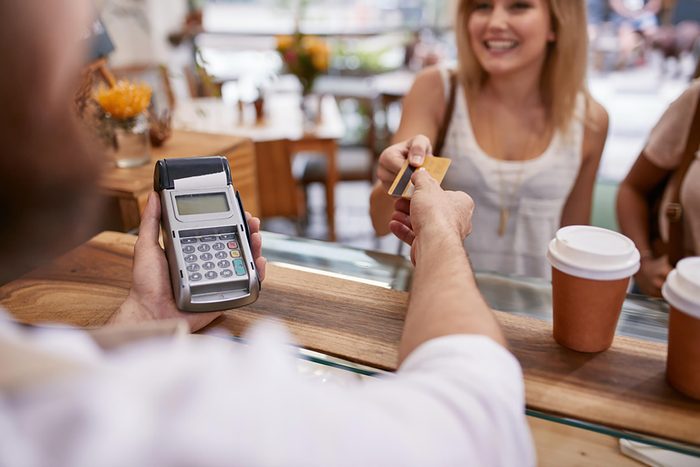
A deal seems too good to be true
Who doesn’t love a good sale? However, if you come across a deal that seems too good to be true, that’s because it probably is. Delgado cautions against entering your credit card information on what could be a retail copycat site.
“With online shopping in general, it’s best to verify the seller and read reviews of the business you’re purchasing from,” he says. Keep an eye out for red flags such as too-good-to-be-true prices and low-quality, insecure websites. “Buying things through social media ads can be risky, as scammers often use social media ads to promote fake products, steal credit card information or never ship the item,” Delgado adds.
That said, legitimate businesses also advertise through social media, so he says the best tactic is to use caution whenever shopping. When in doubt about a social media ad, head to the company’s official website. If they are having a great sale, the details will be on their website. If not, you’ll know that the ad was a scam.
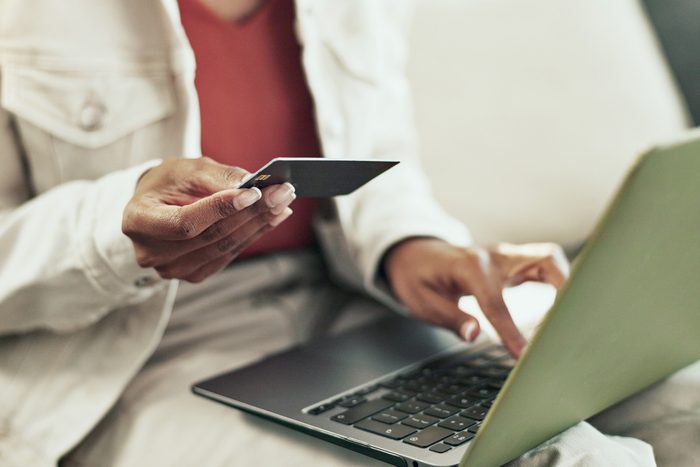
FAQ
How can you determine whether you should use a credit card?
According to Morgan, using a credit card for most things makes sense, especially in risky situations. “Credit cards provide a layer of protection that cash or a debit card does not allow for,” she says. “If a credit card number is compromised, you can dispute the transactions and get a new card.” Credit cards also allow you to dispute transactions over quality issues, Morgan says.
That said, you may want to avoid using a credit card if you’re struggling with high balances and debt. “If you have trouble budgeting, paying cash helps you keep track of expenses,” she adds.
Is it OK to never use a credit card?
Yes. My family has managed just fine without credit cards for years now. Moreover, Kingsley points out that there are plenty of ways to pay for goods and services besides a credit card. In addition to cash, here are some other ways to pay.
- Checks: “Although declining in usage, there are many people who still use checks regularly, especially for business transactions,” Kingsley says. If you prefer to pay by check, Kingsley advises using permanent ink and writing the amount in numbers and words. Never make it out to cash.
- Wire transfers: “Wire transfers are convenient and secure, and they work like sending cash,” he explains. But they can be a target for scammers, because they are typically used for high dollar transactions and cannot be reversed. Only send a wire when you know the details of the recipient, Kingsley says, and never send one if you feel pressured or urged to send it.
- Person-to-person: According to Kingsley, person-to-person payments through apps like Zelle can be quick and convenient ways to send and receive money from family and friends. “They are intended to be used to send cash to people you know, for things like splitting a bill, paying a babysitter or covering your part of the rent,” he says. But he cautions against using these apps to pay for things, especially on social media. “If you send money for something that turns out to be a scam, you may never get it back.”
About the experts
|
Why trust us
At Reader’s Digest, we’re committed to producing high-quality content by writers with expertise and experience in their field in consultation with relevant, qualified experts. We rely on reputable primary sources, including government and professional organizations and academic institutions as well as our writers’ personal experiences where appropriate. We verify all facts and data, back them with credible sourcing and revisit them over time to ensure they remain accurate and up to date. Read more about our team, our contributors and our editorial policies.
Sources:
- Ashley F. Morgan, debt and bankruptcy lawyer and owner of Ashley F. Morgan Law; email interview, Feb. 12, 2025
- Vincent Delgado, education outreach manager at SESLOC Credit Union; email interview, Feb. 24, 2025
- Darius Kingsley, managing director and head of consumer banking practices at JPMorgan Chase; email interview, Feb. 10, 2025




















